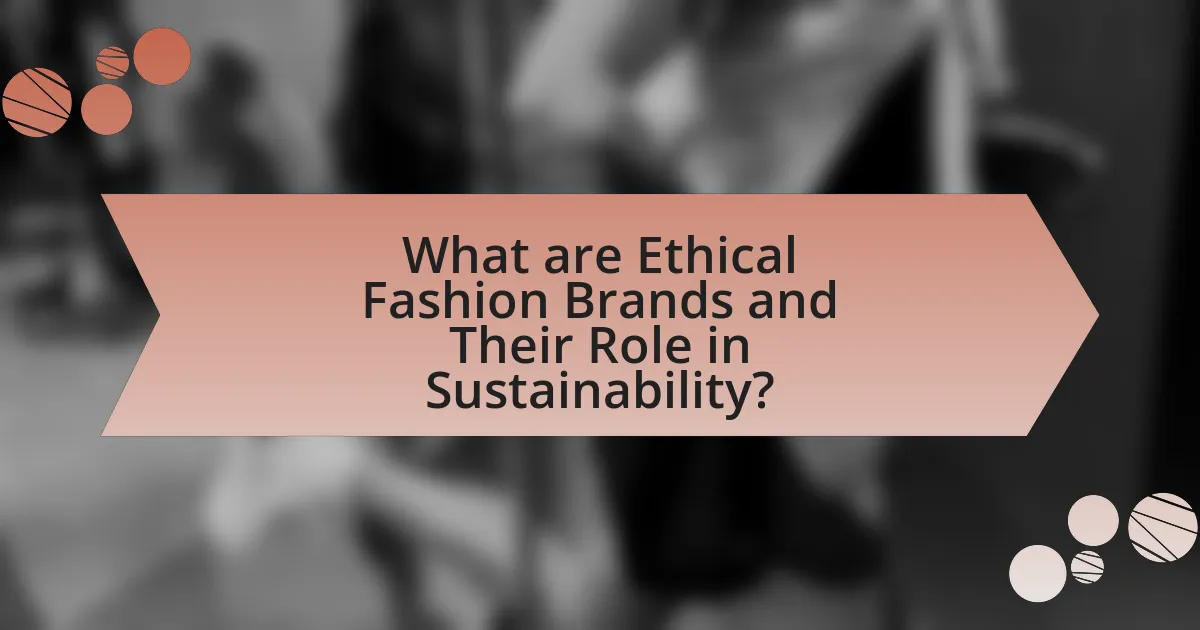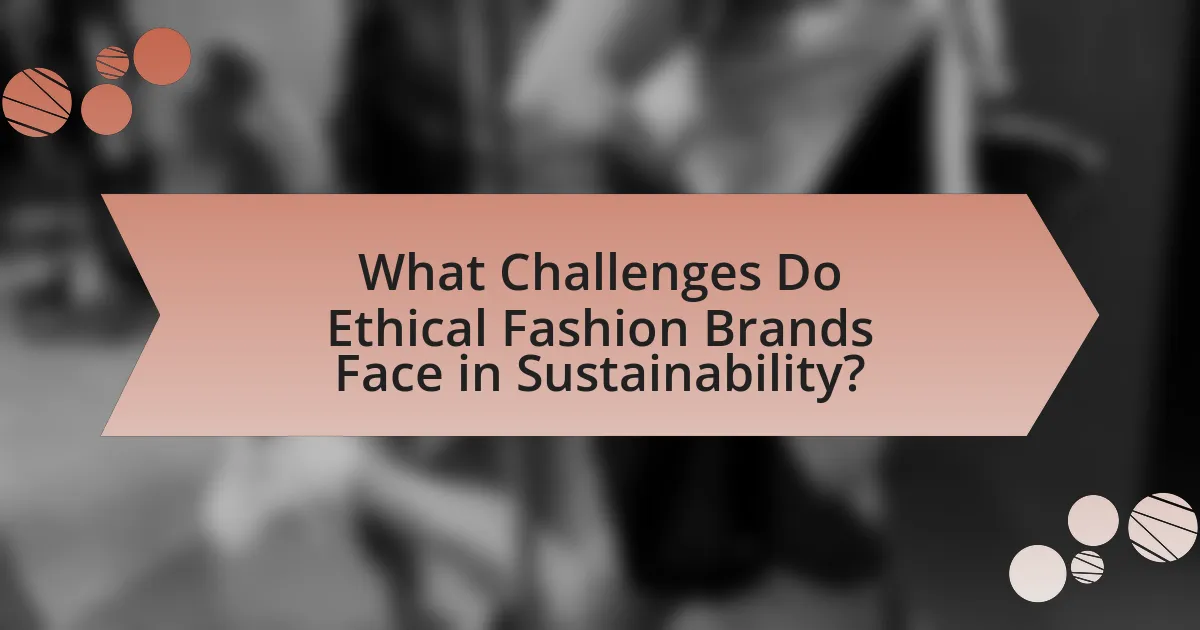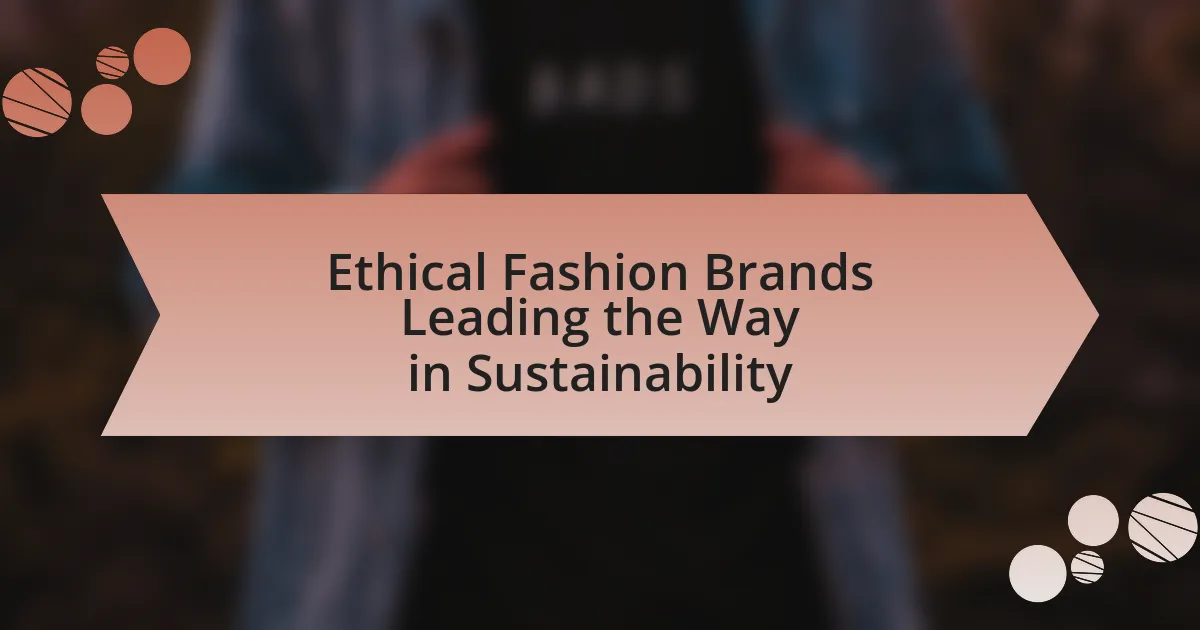Ethical fashion brands are companies that prioritize social and environmental responsibility in their production processes, playing a vital role in promoting sustainability within the fashion industry. This article explores how these brands define sustainability, the principles guiding their practices, and the metrics they use to measure their impact. It highlights the importance of sustainability in addressing environmental issues associated with traditional fashion practices and examines the influence of consumer demand on ethical practices. Additionally, the article discusses leading ethical brands, their innovative approaches, and the challenges they face in achieving sustainability, while providing practical steps for consumers to support ethical fashion.

What are Ethical Fashion Brands and Their Role in Sustainability?
Ethical fashion brands are companies that prioritize social and environmental responsibility in their production processes and business practices. These brands play a crucial role in sustainability by promoting fair labor practices, using eco-friendly materials, and reducing waste through sustainable manufacturing techniques. For instance, brands like Patagonia and Eileen Fisher implement transparent supply chains and advocate for environmental conservation, demonstrating their commitment to sustainability. According to a 2021 report by the Global Fashion Agenda, the fashion industry is responsible for 10% of global carbon emissions, highlighting the urgent need for ethical practices to mitigate environmental impact.
How do Ethical Fashion Brands define sustainability?
Ethical fashion brands define sustainability as a holistic approach that encompasses environmental, social, and economic dimensions. This definition emphasizes the importance of minimizing environmental impact through eco-friendly materials and production processes, ensuring fair labor practices, and promoting transparency in supply chains. For instance, brands like Patagonia and Eileen Fisher prioritize the use of organic and recycled materials, which significantly reduce resource consumption and pollution. Additionally, they advocate for fair wages and safe working conditions, aligning with the principles of social responsibility. This comprehensive understanding of sustainability is supported by various studies, including the 2020 Fashion Transparency Index, which highlights the growing commitment of ethical brands to sustainable practices and accountability in the fashion industry.
What principles guide Ethical Fashion Brands in their sustainability efforts?
Ethical fashion brands are guided by principles such as transparency, fair labor practices, environmental responsibility, and sustainable sourcing. Transparency ensures that brands disclose their supply chain practices, allowing consumers to make informed choices. Fair labor practices involve providing safe working conditions and fair wages to workers, which is essential for ethical production. Environmental responsibility focuses on minimizing waste, reducing carbon footprints, and using eco-friendly materials, which helps combat climate change. Sustainable sourcing emphasizes the use of renewable resources and ethical materials, ensuring that the production process does not deplete natural resources. These principles collectively contribute to a more sustainable and ethical fashion industry.
How do Ethical Fashion Brands measure their sustainability impact?
Ethical fashion brands measure their sustainability impact through various metrics and frameworks, including life cycle assessments (LCAs), carbon footprint calculations, and adherence to sustainability certifications. These brands often utilize LCAs to evaluate the environmental effects of their products from raw material extraction to disposal, providing a comprehensive view of their ecological footprint. For instance, brands may calculate their carbon emissions per product, which allows them to identify areas for improvement and track progress over time. Additionally, certifications such as Global Organic Textile Standard (GOTS) or Fair Trade provide third-party validation of their sustainable practices, ensuring transparency and accountability in their operations.
Why is sustainability important in the fashion industry?
Sustainability is important in the fashion industry because it addresses environmental degradation, social inequality, and economic viability. The fashion industry is one of the largest polluters globally, contributing to significant waste and carbon emissions; for instance, it accounts for about 10% of global carbon emissions and is responsible for 20% of wastewater. By adopting sustainable practices, brands can reduce their ecological footprint, promote fair labor practices, and ensure long-term economic health. Sustainable fashion initiatives, such as using organic materials and ethical labor, not only mitigate environmental impact but also cater to the growing consumer demand for responsible products, with 66% of global consumers willing to pay more for sustainable brands.
What environmental issues are associated with traditional fashion practices?
Traditional fashion practices are associated with several significant environmental issues, including excessive water consumption, pollution from dyes and chemicals, and textile waste. The fashion industry is responsible for using approximately 93 billion cubic meters of water annually, which contributes to water scarcity in many regions. Additionally, the use of synthetic dyes and chemicals in garment production leads to the contamination of water bodies, harming aquatic ecosystems and affecting human health. Furthermore, traditional fashion practices generate substantial textile waste, with an estimated 92 million tons of waste produced each year, much of which ends up in landfills, contributing to greenhouse gas emissions. These factors collectively highlight the detrimental environmental impact of conventional fashion practices.
How does consumer demand influence sustainable practices in fashion?
Consumer demand significantly influences sustainable practices in fashion by driving brands to adopt eco-friendly materials and ethical production methods. As consumers increasingly prioritize sustainability, brands respond by integrating practices such as using organic fabrics, reducing waste, and ensuring fair labor conditions. For instance, a 2021 survey by McKinsey & Company found that 67% of consumers consider sustainability when making a purchase, prompting brands to innovate and align their offerings with these values. This shift not only enhances brand loyalty but also encourages a broader industry transformation towards sustainability.

Which Ethical Fashion Brands are Leading the Way?
Patagonia, Eileen Fisher, and Reformation are leading ethical fashion brands. Patagonia is recognized for its commitment to environmental sustainability, using recycled materials and promoting fair labor practices. Eileen Fisher focuses on sustainable sourcing and has a take-back program for its garments, emphasizing circular fashion. Reformation is known for its transparency in production processes and uses eco-friendly materials, aiming to reduce its carbon footprint. These brands exemplify leadership in ethical fashion through their innovative practices and dedication to sustainability.
What are some notable examples of Ethical Fashion Brands?
Notable examples of ethical fashion brands include Patagonia, Everlane, and Reformation. Patagonia is recognized for its commitment to environmental sustainability and fair labor practices, using recycled materials and donating a percentage of profits to environmental causes. Everlane emphasizes transparency in its pricing and production processes, ensuring ethical labor practices and sustainable materials. Reformation focuses on eco-friendly fabrics and practices, aiming to reduce its carbon footprint while promoting ethical manufacturing. These brands exemplify the principles of ethical fashion through their dedication to sustainability and social responsibility.
How do these brands implement sustainable practices?
Brands implement sustainable practices by utilizing eco-friendly materials, adopting ethical labor practices, and minimizing waste throughout their production processes. For instance, many brands source organic cotton or recycled fabrics, which significantly reduce environmental impact compared to conventional materials. Additionally, these brands often ensure fair wages and safe working conditions for their workers, aligning with ethical labor standards. Furthermore, they adopt circular economy principles, such as recycling and upcycling, to minimize waste, with some brands reporting a reduction in waste by up to 50% through these initiatives.
What unique approaches do these brands take towards ethical fashion?
These brands adopt unique approaches to ethical fashion by prioritizing sustainable materials, transparent supply chains, and fair labor practices. For instance, some brands utilize organic cotton and recycled fabrics to minimize environmental impact, while others implement traceability systems that allow consumers to see the journey of their garments from production to purchase. Additionally, many of these brands ensure fair wages and safe working conditions for their workers, aligning with the principles of ethical labor. This commitment to sustainability and ethics not only enhances brand credibility but also fosters consumer trust and loyalty.
How do these brands communicate their sustainability efforts?
Brands communicate their sustainability efforts through transparent reporting, engaging storytelling, and certifications. For instance, many brands publish annual sustainability reports detailing their environmental impact, goals, and progress, which fosters accountability and trust. Additionally, they utilize social media and marketing campaigns to share stories about their sustainable practices, such as sourcing materials responsibly or reducing waste, which resonates with consumers. Certifications from recognized organizations, like Fair Trade or Global Organic Textile Standard, further validate their claims and enhance credibility. These methods collectively ensure that consumers are informed about the brands’ commitment to sustainability.
What marketing strategies do Ethical Fashion Brands use to promote sustainability?
Ethical fashion brands utilize various marketing strategies to promote sustainability, including transparency in their supply chains, storytelling that highlights their ethical practices, and engaging with consumers through social media platforms. Transparency allows brands to build trust by openly sharing information about sourcing materials and labor practices, which resonates with environmentally conscious consumers. Storytelling effectively communicates the brand’s mission and values, often showcasing the positive impact of sustainable practices on communities and the environment. Additionally, social media engagement fosters a community around sustainability, encouraging consumers to participate in discussions and share their experiences, thereby amplifying the brand’s message. These strategies collectively enhance brand loyalty and attract a growing demographic that prioritizes ethical consumption.
How do consumers respond to the messaging of these brands?
Consumers generally respond positively to the messaging of ethical fashion brands that emphasize sustainability. This positive response is often reflected in increased brand loyalty and purchasing behavior, as consumers are increasingly prioritizing ethical considerations in their buying decisions. For instance, a 2021 survey by McKinsey & Company found that 67% of consumers consider sustainability when making a purchase, indicating a strong alignment between consumer values and brand messaging focused on ethical practices. Additionally, brands that effectively communicate their commitment to sustainability often see higher engagement rates on social media platforms, further demonstrating consumer support for their messaging.

What Challenges Do Ethical Fashion Brands Face in Sustainability?
Ethical fashion brands face significant challenges in sustainability, primarily due to high production costs, supply chain transparency, and consumer awareness. High production costs arise from sourcing sustainable materials and ensuring fair labor practices, which can lead to higher retail prices that deter price-sensitive consumers. Supply chain transparency is another challenge, as brands must ensure that every step of their production process adheres to ethical standards, which can be complex and resource-intensive. Additionally, consumer awareness and demand for sustainable products can be inconsistent, making it difficult for brands to predict market trends and maintain profitability. According to a report by McKinsey & Company, only 30% of consumers are willing to pay more for sustainable fashion, highlighting the gap between ethical practices and consumer purchasing behavior.
What are the common obstacles to achieving sustainability in fashion?
The common obstacles to achieving sustainability in fashion include high production costs, lack of consumer awareness, and insufficient regulatory frameworks. High production costs arise from the use of sustainable materials and ethical labor practices, which can lead to higher retail prices that deter consumers. Lack of consumer awareness limits demand for sustainable products, as many shoppers prioritize price and convenience over environmental impact. Insufficient regulatory frameworks fail to enforce sustainable practices across the industry, allowing unsustainable methods to persist. According to a report by McKinsey & Company, the fashion industry is responsible for 2-8% of global greenhouse gas emissions, highlighting the urgent need for systemic change to overcome these obstacles.
How do supply chain complexities impact sustainability efforts?
Supply chain complexities significantly hinder sustainability efforts by introducing inefficiencies and increasing carbon footprints. These complexities arise from factors such as global sourcing, multi-tier suppliers, and varying regulatory standards, which complicate the tracking of sustainable practices. For instance, a study by the World Economic Forum indicates that supply chain disruptions can lead to a 20-30% increase in emissions due to inefficient logistics and transportation. Additionally, the lack of transparency in complex supply chains makes it challenging for brands to ensure ethical sourcing and production, ultimately undermining their sustainability goals.
What role does consumer behavior play in these challenges?
Consumer behavior significantly influences the challenges faced by ethical fashion brands in sustainability. As consumers increasingly prioritize sustainability, their purchasing decisions directly impact brand strategies and market dynamics. For instance, a 2021 survey by McKinsey found that 67% of consumers consider sustainability when making a purchase, compelling brands to adapt their practices to meet these expectations. This shift in consumer preferences creates pressure on ethical fashion brands to maintain transparency and accountability, as failure to align with consumer values can lead to loss of market share and brand loyalty.
How can Ethical Fashion Brands overcome these challenges?
Ethical fashion brands can overcome challenges by implementing transparent supply chains and adopting sustainable materials. Transparency allows consumers to understand the sourcing and production processes, fostering trust and loyalty. For instance, brands like Everlane and Patagonia provide detailed information about their factories and materials, which enhances consumer confidence. Additionally, utilizing sustainable materials, such as organic cotton or recycled fabrics, reduces environmental impact and aligns with consumer demand for eco-friendly products. According to a 2021 McKinsey report, 67% of consumers consider sustainability when making a purchase, highlighting the importance of these strategies for ethical fashion brands.
What innovative solutions are being implemented by leading brands?
Leading brands in the ethical fashion sector are implementing innovative solutions such as circular fashion models, sustainable materials, and transparent supply chains. For instance, brands like Stella McCartney utilize recycled materials and promote a circular economy by encouraging customers to return used garments for recycling. Additionally, companies like Patagonia focus on using organic cotton and recycled polyester, significantly reducing their environmental impact. Transparency is exemplified by Everlane, which shares detailed cost breakdowns and factory information, fostering consumer trust and accountability. These approaches not only enhance sustainability but also align with growing consumer demand for ethical practices in fashion.
How can collaboration within the industry enhance sustainability?
Collaboration within the industry can enhance sustainability by enabling shared resources, knowledge, and best practices among companies. When fashion brands work together, they can pool their expertise to develop innovative sustainable materials and production methods, reducing environmental impact. For instance, the Sustainable Apparel Coalition, which includes major brands like Nike and H&M, focuses on improving sustainability through collective action and shared metrics, leading to measurable reductions in water usage and carbon emissions across the industry. This collaborative approach not only drives efficiency but also fosters a culture of accountability and transparency, essential for achieving long-term sustainability goals.
What practical steps can consumers take to support Ethical Fashion Brands?
Consumers can support Ethical Fashion Brands by prioritizing purchases from companies that demonstrate transparency in their supply chains and ethical labor practices. This includes researching brands to ensure they use sustainable materials, pay fair wages, and maintain safe working conditions. According to a 2021 report by the Ethical Fashion Forum, brands that are transparent about their sourcing and production processes are more likely to engage in ethical practices. Additionally, consumers can choose to buy second-hand clothing, which reduces waste and supports a circular economy. Engaging in advocacy by promoting ethical brands on social media and participating in campaigns that raise awareness about sustainable fashion also contributes to the movement.
How can consumers identify truly ethical brands?
Consumers can identify truly ethical brands by examining their transparency, certifications, and supply chain practices. Ethical brands often provide detailed information about their sourcing, labor practices, and environmental impact. Certifications such as Fair Trade, GOTS (Global Organic Textile Standard), and B Corp indicate adherence to ethical standards. Additionally, brands that openly share their sustainability goals and progress, such as reducing carbon footprints or using recycled materials, demonstrate a commitment to ethical practices. Research shows that 66% of consumers are willing to pay more for sustainable brands, highlighting the demand for transparency and ethical accountability in the fashion industry.
What are the best practices for sustainable fashion shopping?
The best practices for sustainable fashion shopping include prioritizing quality over quantity, choosing brands that use eco-friendly materials, and supporting ethical labor practices. Prioritizing quality ensures that garments last longer, reducing waste; for instance, clothing made from organic cotton or recycled materials minimizes environmental impact. Choosing brands that are transparent about their supply chains and labor conditions, such as those certified by Fair Trade or similar organizations, supports ethical practices and fair wages for workers. Additionally, shopping second-hand or vintage reduces demand for new production, further contributing to sustainability. These practices collectively help mitigate the negative effects of fast fashion on the environment and society.
